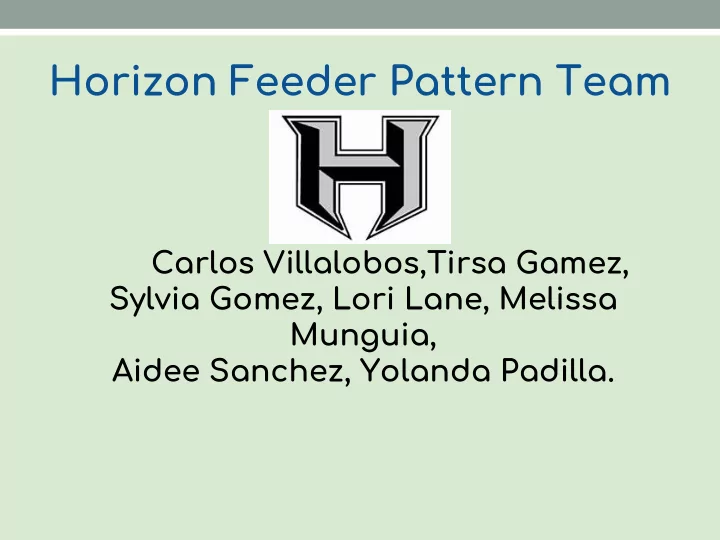

Horizon Feeder Pattern Team Carlos Villalobos,Tirsa Gamez, Sylvia Gomez, Lori Lane, Melissa Munguia, Aidee Sanchez, Yolanda Padilla.
S ocial Emotional Activity Everybody please stand up and get Ready to Move! Go Noodle Video
Social and Emotional Needs
POSITIVE SCHOOL CULTURE This presentation will consist of a few pointers to help enrich a positive school culture at your campus. This presentation offers few important concepts that engaged and stayed with us from the Houston, Texas Parental Engagement Conference.
How Do I Talk to My Child about Hard Topics?
How Do I Talk to My Child about Hard Topics? 5 Basic Skills: #1- What do I want? #2- How can I share my views? #3- Do I need to apologize? #4- What if they misunderstand? #5- What if they won’t talk?
Communication is Key Deal with the present-only this behavior not past Pay attention to your form of communication; 55% of communication is nonverbal, 38% is tone of voice and only 7% is verbal
The most important skill is To make eye contact, To listen carefully, and To be empathetic and caring.
Parental Engagement + Student Coping Skills = Classroom Behavior • What you need to know they bring from home • Toxic stress-social and emotional learning (ex. Self-regulate, proactive versus reactive) • What we can do within a 45 minute time span • Traditions· Rituals · Tell students what “we” are going to do not what “you” are going to do •How to reach the unreachable student • Separate- the child from the family (example addictive families) • Generational Poverty- impact emotional health •Where do we start? • Students are visual- body language and tone of voice say volumes All Misbehavior Stems from Discouragement • Attention Power Revenge Feelings of Inadequacy
Fears of Parents • 33% bullying- will they fit in, will they have someone to eat with •28% doing well in school •21% right kinds of friends, make good choices •18% others Just because you have been in high school it doesn’t mean they are graduating, we need to educate our parents and students.
All Misbehavior Stems From Discouragement O ur life experiences impact our behavior Toxic stress-social and emotional learning/behavior (ex. Self-regulate, proactive versus reactive) Generational Poverty- impact emotional health/substance abuse-don’t tell rule Parents -Over compensate for not being home to raise them and do not enforce rules Family dynamics have shifted- older siblings raise younger and are authority figures at home
How to Run an Effective Family Meeting Meet at a Regularly Scheduled Time Decide on Time Limits and Stick to them Rotate positions Ensure everyone has a chance to offer their ideas The parents need to decide on the decision-making process Do not allow meetings to become gripe sessions Distribute chores fairly Plan family fun Use your communication skills Evaluate the family meeting Evaluate decisions at the next family meeting
Conclusion Recipe for a Positive School Culture
Recommend
More recommend